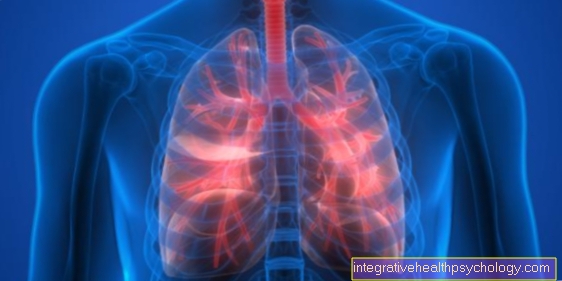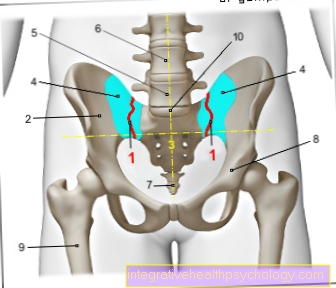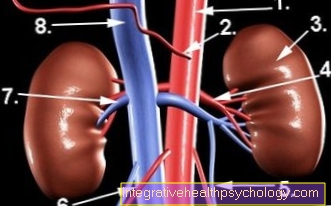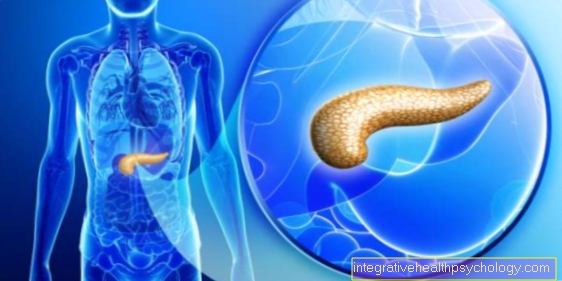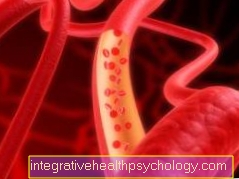Constipation in Pregnancy
introduction
Constipation, also known as constipation in medical jargon, means a rare evacuation of hard stool.
By definition, constipation is when stool is lost less than 3 times a week. However, since bowel activity and thus stool behavior vary greatly from person to person, this definition is not suitable for everyone. Some people have bowel movements several times a day, others just a few times a week.
Constipation often becomes a problem during pregnancy. This has to do with the hormonal change.

Up to 40% of pregnant women suffer from constipation during pregnancy. In order to protect the unborn child, drugs used to treat constipation should be used very carefully during pregnancy. Therefore, home remedies and a healthy lifestyle for constipation during pregnancy are of great importance.
causes
The main reasons why constipation occurs more frequently during pregnancy are primarily hormonal in nature.
During pregnancy, the hormone progesterone increases significantly. This hormone lowers the movement (motility) of the muscles of the branded intestinal tract, there is a decrease in peristalsis. In medicine, peristalsis describes the digestive movements of the intestine. In addition to the hormonal factor, decreased exercise in pregnant women and changes in eating habits can be the cause.
What are signs of constipation?
If the expectant mother notices that she can go to the toilet much less often than usual and often takes a long time and has to press a lot because the stool is very hard, these are relatively sure signs of constipation.
In addition to the problems with defecation, there is often an uncomfortable feeling of fullness with a bloated and hard stomach. Abdominal pain can also occur.
Hard belly in constipation during pregnancy
A hard stomach that feels bloated and bloated is common in constipation because the stool that builds up in the sluggish intestine is firm and hard. Abdominal pain can also occur. These complaints can lead to a general malaise and a decrease in appetite and can therefore be very uncomfortable.
Flatulence associated with constipation during pregnancy
In addition to a hard stomach and discomfort, flatulence can also occur as an accompanying symptom of constipation. It often relieves symptoms such as abdominal pain and bloating for a short time after the winds have subsided. But in the long run the gas is also uncomfortable.
diagnosis
The diagnosis is made clinically, based on the symptoms of the pregnant woman. As already described above, it is difficult to find a general definition in order to decide when to speak of constipation.
Due to the very different bowel habits, constipation is also a very subjective perception, as the woman herself knows best what her stool normally is and how it has changed during pregnancy. Signs of constipation are a decrease in the frequency of stools, i.e. less frequent bowel movements, and the passing of hard stools, which is often associated with heavy pressing.
When a pregnant woman presents to her doctor with constipation, he or she will take a detailed medical history. So he will ask how long the symptoms have existed, what symptoms they are and what the bowel habits were before.
He will also ask about diet, exercise, and amount of drink. This should be followed by a physical examination. An ultrasound examination of the abdomen may also be added, it is not stressful for the child and can provide rough information about the conditions in the abdomen.
What helps or what can be done with constipation during pregnancy?
The main means of treating constipation are very simple and can be used by any pregnant woman who is otherwise healthy.
First of all, adequate fluid intake is essential. The stool that collects in the intestine can only drain well if it is moist enough. If you do not drink enough, the stool becomes very firm and hard, the bowel movements are not stimulated sufficiently and the stool builds up. When you have a bowel movement, the hardness of the stool leads to heavy pressing. Drinking 2 liters a day ensures that the stool in the intestine is supplied with sufficient fluid. It becomes soft and voluminous. This stimulates the bowel movement and makes bowel movements much easier.
Another important factor in treating constipation is getting enough exercise. This is the only way to stimulate bowel activity sufficiently. Physical exercise does not necessarily mean sport. Even that can - in moderate form - do no harm. To treat constipation, however, it is sufficient to go for a walk every day and also to exercise sufficiently.
A third important factor is a healthy and balanced diet in the case of constipation, which should not be missing in any pregnancy. The pregnant woman should eat fruits and vegetables every day and not eat too fatty foods. Dietary fibers, such as those found in fruit, vegetables, whole grain products and muesli, stimulate digestion.
In addition to these three most important measures, various home remedies can also be used.
Drug therapy for constipation should only be given if all of these measures have not been successful.
Read more on the topic: Constipation-what can be done about it?
Home remedies
There are numerous home remedies available to treat constipation. Most of them can safely be used during pregnancy.
Dried fruits such as figs or plums are said to have good laxative properties. It is important that they are not eaten like that, but soaked in sufficient water for some time. They can then be eaten either as it is or, for example, as an addition to yogurt or muesli.
Drinking a glass of (lukewarm) water or tea on an empty stomach in the morning should also have a positive effect on digestion.
Flax seeds or floss seeds are another powerful option. They have to be soaked in sufficient water and can then be consumed, for example, as an addition to muesli. Flax seeds and flax seeds are bulking agents that swell in the intestine and thus stimulate bowel activity. With these remedies, however, an additional sufficient fluid intake is essential, as otherwise the symptoms of constipation may increase.
Taking a tablespoon of oil in the morning on an empty stomach should also significantly stimulate digestion. Olive oil, for example, can be used for this. When choosing the oil, however, pregnant women should be careful because castor oil is also said to have a good effect. However, this can promote labor and should therefore not be taken by pregnant women.
Sauerkraut is also said to help against constipation.
Measures such as a stomach massage or a hot water bottle can also be helpful. As an intermediate between home remedies and medication, milk sugar (lactose) should be added.It is available over-the-counter at the pharmacy. Some of the powder is poured into a glass of water and the mixture is then drunk. However, this home remedy is also only moderately suitable for pregnant women. The attending gynecologist should be asked beforehand whether this type of home remedy can be used.
All in all, the most effective means and harmless for pregnant women are bulking agents and bulking agents such as flax seeds, flax seeds or wheat bran. However, care must be taken to ensure adequate fluid intake. However, every woman should test for herself which of these home remedies suits her best.
Read more on the topic: Home remedies for constipation
Drugs used to treat constipation in pregnancy
If the measures already mentioned do not have an adequate effect, drug therapy may be necessary.
However, particular caution should be exercised here during pregnancy, not all laxatives are suitable for pregnant women.
The laxative lactulose is the drug of choice for pregnant women. It works similarly to the milk sugar lactose. It draws water into the intestines and thus has a moderate laxative effect. Lactulose can be used in all stages of pregnancy. It is available as a syrup. Alternatively, macrogol can be used. This active ingredient also draws water into the intestinal lumen. It is a powder that is put into a glass of water and then drunk. Macrogol can also be used in all phases of pregnancy. Bisacodyl should only be used if these drugs do not help either. These are means that stimulate bowel activity and stool transport. Use during pregnancy is possible, but not the first choice. Mannitol or sorbitol can also be used, but should only be considered after exhausting the other options.
Homeopathic remedies for the treatment of constipation
Common homeopathic remedies for the treatment of constipation, including during pregnancy, are Alumina (aluminum oxide), Sulfur (sulfur), Pulsatilla pratensis (pasque flower), Graphites (graphite) and Nux vomica (nausea).
Does an enema help with constipation during pregnancy?
Enema in the classic sense is out of the question during pregnancy, except in the context of childbirth preparation.
However, there are mini enemas that only affect the rectum. An example of this is microklist. It can be bought over the counter in the pharmacy. After inserting the mini-tube into the anus and dispensing the medication, it acts directly on the stool there. There is therefore no risk to the unborn child.
Such a small enema should still only be used if the other variants mentioned above did not help. If the symptoms are very severe and need to be remedied quickly, it can also be used early on. However, regular use should be avoided.
Duration
Constipation in pregnancy can sometimes show up throughout pregnancy. So women often struggle with it throughout pregnancy. It is all the more important to take countermeasures as early as possible, with diet, drinking and physical activity playing an essential role here. After pregnancy, the symptoms of constipation have often completely disappeared. However, they can recur in the same way in a second pregnancy.
Is the clenching dangerous for the baby?
Heavy pressing in hard stools and constipation poses no risk to the child. However, it is associated with other complications in the expectant mother such as hemorrhoids, anal vein thrombosis or anal fissures, so constipation should be treated during pregnancy.
Please also read: Hemorrhoids During Pregnancy - Is It Dangerous?



